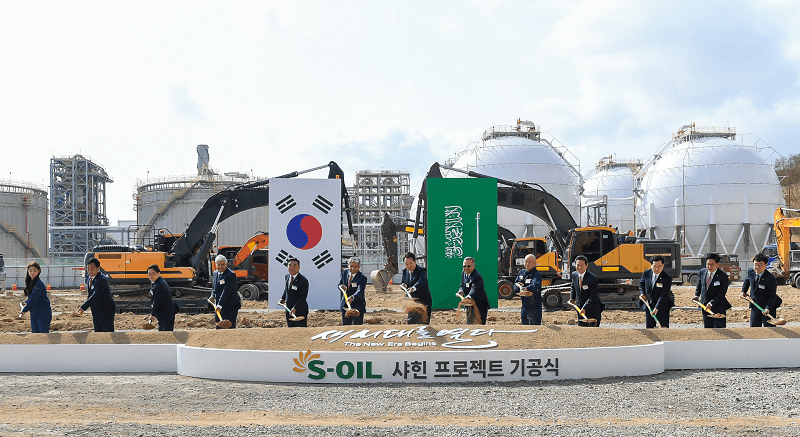


South Korea’s S-Oil Corporation continues to advance its major petrochemical expansion project, the Shaheen Olefins Complex, in Ulsan. The project, which officially broke ground in March 2023 and is expected to be completed by 2026, represents a significant step in South Korea’s refining and petrochemical industry, aiming to enhance the country’s capacity to produce high-value petrochemical products. The development aligns with global trends toward integrated refining and petrochemical operations, maximizing efficiency and profitability.
The Shaheen project is part of a broader strategy by S-Oil, which is majority-owned by Saudi Aramco, to diversify beyond traditional fuel production. As the global energy transition accelerates, oil refiners are seeking new revenue streams, and investments in petrochemicals provide a viable solution. Petrochemical products, including ethylene, propylene, and other olefins, serve as key raw materials for plastics, synthetic fibers, and numerous industrial applications.
S-Oil’s new complex will integrate cutting-edge technologies to convert crude oil directly into petrochemical feedstocks, increasing efficiency and reducing reliance on conventional refining processes. The project also supports South Korea’s ambition to maintain a competitive petrochemical industry amid increasing global demand and evolving environmental regulations.
The Shaheen Olefins Complex, once completed, will be one of the largest petrochemical plants in South Korea. The facility is designed to produce a range of high-value petrochemicals, including:
Ethylene and Propylene: Essential components in plastic manufacturing and various industrial chemicals.
Benzene, Toluene, and Xylene (BTX): Key feedstocks for synthetic materials and solvents.
Polyolefins and Derivatives: Used in packaging, automotive parts, and construction materials.
The development of this complex reflects a global shift toward advanced refining and petrochemical integration, optimizing crude oil use and reducing waste.
_1743478985_WNo_1332d930.jpg)
Given the scale and complexity of the Shaheen project, advanced material solutions are crucial to ensuring durability, safety, and efficiency. Clad plates, which combine two or more metals through explosive bonding or rolling, offer significant advantages in petrochemical plant construction, including:
Corrosion Resistance: The aggressive chemical environment in petrochemical processing requires materials that can withstand high temperatures, corrosive fluids, and extreme pressure. Clad plates with corrosion-resistant alloys such as titanium, nickel, or stainless steel provide long-term protection against degradation.
Cost Efficiency: By using a thin layer of expensive corrosion-resistant material bonded to a strong but less costly base metal (such as carbon steel), clad plates offer a cost-effective solution without compromising performance.
High Strength and Durability: Equipment such as heat exchangers, reactors, and pressure vessels in the Shaheen complex will require materials that can withstand harsh operating conditions. Clad plates enhance structural integrity and extend the service life of these critical components.
Enhanced Safety: Clad materials reduce the risk of leaks, structural failures, and hazardous chemical exposure, ensuring the safe operation of high-temperature and high-pressure systems.
The successful implementation of the Shaheen Olefins Complex will reinforce South Korea’s position as a key player in the global petrochemical market. The use of advanced materials such as clad plates can further enhance the sustainability and efficiency of such large-scale projects, reducing maintenance costs and environmental risks.
As more refiners and petrochemical companies look to modernize their facilities, the demand for high-performance materials like clad plates is expected to grow. Companies specializing in clad materials, such as those producing explosive clad plates, rolled clad plates, and transition joints, have an opportunity to contribute to the future of industrial infrastructure by supplying critical components for these next-generation petrochemical complexes.
Nanjing Fugo New Material Tech Co., Ltd. (Fugo Tech) is an ISO 9001 and PED 2014/68/EU certified manufacturer specializing in Clad Material (Explosive Clad Plates & Rolled Clad Plate, Clad Bar & Clad Transition Joints) and Titanium, Nickel Alloy, and Stainless Steel products (Pipe/Fitting/Flange/Fastener) which are widely used in the Heat Exchanger, Pressure Vessel, Reactor, Column, Tower, and other process equipment.
Fugo Tech offers a wide range of materials, including Titanium, Nickel Alloy, Copper, Cu-Ni, and Stainless Steel, along with custom processing services (Tube Sheet drilling, Dish Head forming, and Overlay Welding) for Oil & Gas, Petrochemical, Chemical, Energy, Paper & Pulp, Marine, Shipbuilding, Environment, Metallurgy, and New Energy Vehicles, with a strong focus on high-performance Clad Plate & Titanium & Nickel Alloy & Stainless Steel solutions.
For any new requirement, please contact: sales@fugo-tech.com



Fugo Tech is focused on the manufacturing of clad metal plate and distributes the Stainless Steel, Titanium, Nickel Alloy, Zirconium and other non-ferrous metal pipes, fittings, flanges, and fasteners.